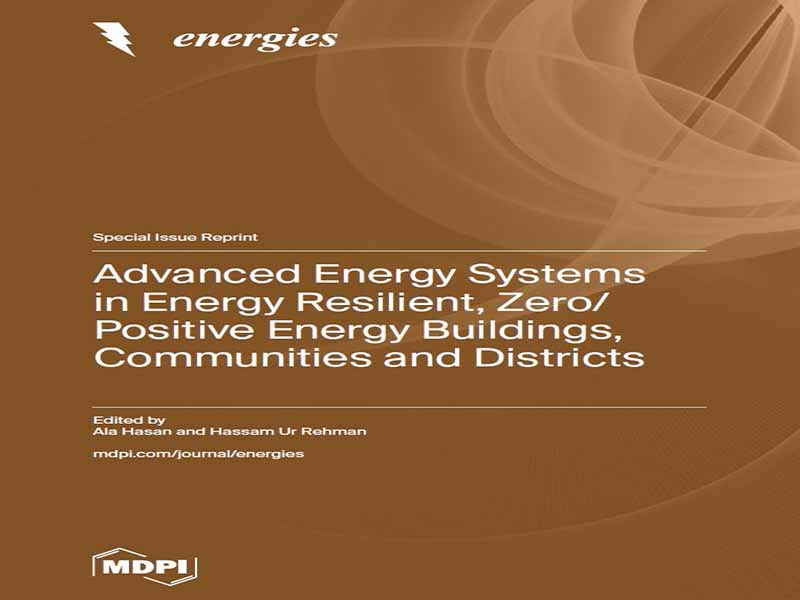- عنوان کتاب: Advanced Energy Systems in Energy Resilient, ZeroPositive Energy Buildings, Communities and Districts
- نویسنده: Ala Hasan and Hassam Ur Rehman
- حوزه: برق ساختمان
- سال انتشار: 2025
- تعداد صفحه: 364
- زبان اصلی: انگلیسی
- نوع فایل: pdf
- حجم فایل: 10.1 مگابایت
تلاشهای مربوط به اقدامات اقلیمی برای کاهش انتشار گازهای گلخانهای در بخش ساختمان برای شهرهای سراسر جهان مهم است. به طور کلی، این بخش تقریباً ۴۰٪ از مصرف انرژی اتحادیه اروپا و ۳۶٪ از انتشار گازهای گلخانهای آن را بر عهده دارد. بنابراین، انرژی در ساختمانها، جوامع و مناطق در خط مقدم کاهش انتشار گازهای گلخانهای و تضمین آیندهای پایدار، خودکفا و ایمن قرار دارد. این اهداف را میتوان با افزایش بهرهوری انرژی و استفاده از فناوریهای پیشرفته تولید، تبدیل و ذخیرهسازی انرژی تجدیدپذیر در محل در ساختمانها، جوامع و مناطق، که میتوانند انرژی وارد شده از شبکهها را جبران کنند، محقق کرد. مفاهیم مختلفی برای ساختمانها و مناطق با انرژی خالص صفر/مثبت (NZPEBDs) در سالهای اخیر ظهور کردهاند تا شهرها را در آینده نزدیک به جوامع کربن خنثی تبدیل کنند. علاوه بر این، تغییرات اقلیمی و بحرانهای انرژی (رویدادهای مخرب) میتوانند عملکرد انرژی یک ساختمان را کاهش داده و بر رفاه و شرایط سکونت ساکنان، به ویژه در هنگام قطع برق، تأثیر بگذارند. این ساختمانها و مناطق همچنین میتوانند به خودکفایی، مشارکت کاربران و ایجاد تابآوری انرژی در هنگام قطع برق کمک کنند. این شماره ویژه، تحقیقات نوآورانهای را در حوزه ساختمانها، مناطق و محیطهای ساختهشده ارائه میدهد و در عین حال، مسیرهایی را به سوی مسیرهای تحقیقاتی جدید و چالشبرانگیز برای تحقیقات بیشتر فراهم میکند. ما دریافتیم که حجم زیادی از موضوعات تحقیقاتی پوشش داده شده، نشاندهنده تنوع و تکامل این حوزه است. امیدواریم نتایج تحقیقات ارائه شده به توسعه و تحقیقات آینده در زمینه محیطهای ساختهشده کمک کند. به عنوان سردبیر مهمان این شماره ویژه، مایلیم از نویسندگان و نویسندگان همکار که مقالات خود را منتشر کردهاند، تشکر و قدردانی کنیم. همچنین از داوران فوقالعادهای که وقت، نظرات و پیشنهادات ارزشمندشان به بهبود کیفیت مقالات کمک کرد و همچنین از هیئت تحریریه MDPI که در کل فرآیند تولید این شماره ویژه به ما کمک کردند، سپاسگزاریم.
Climate action efforts to reduce greenhouse gas emissions in the building sector are important for cities around the world. In general, this sector is responsible for approximately 40% of the EU’s energy consumption and 36% of its emissions. Therefore, energy in buildings, communities, and districts is at the forefront of mitigating emissions and ensuring a sustainable, self-sufficient, and safe future. These goals can be achieved by enhancing energy efficiency and using advanced onsite renewable energy generation, conversion, and storage technologies in buildings, communities, and districts, which can offset the energy imported from grids. Various concepts for net-zero/positive energy buildings and districts (NZPEBDs) have emerged in recent years to shape cities into carbon-neutral communities in the near future. In addition to this, climate change and energy crises (disruptive events) can reduce a building’s energy performance and impact occupants’ well-being and habitability conditions, especially during a power outage. These buildings and districts can also help reach self-sufficiency, engage users, and provide energy resiliency during outages. This Special Issue presents innovative research in the domain of buildings, districts and built environment while providing pathways to the new, challenging research avenues for further research. We found that large amount of research topics that were covered showing the diversity and evolving field. We hope that the research results presented will contribute to the future development and research in the field of build environment. As the Guest Editor of this Special Issue, we would like to say thanks and appreciate to the authors and coauthors who published their articles. We are also grateful to the wonderful reviewers whose valuable time, comments and suggestions helped in improving the quality of the articles and also the MDPI editorial staff who helped us during the entire process of producing the Special Issue.
این کتاب را میتوانید از لینک زیر بصورت رایگان دانلود کنید:





































نظرات کاربران